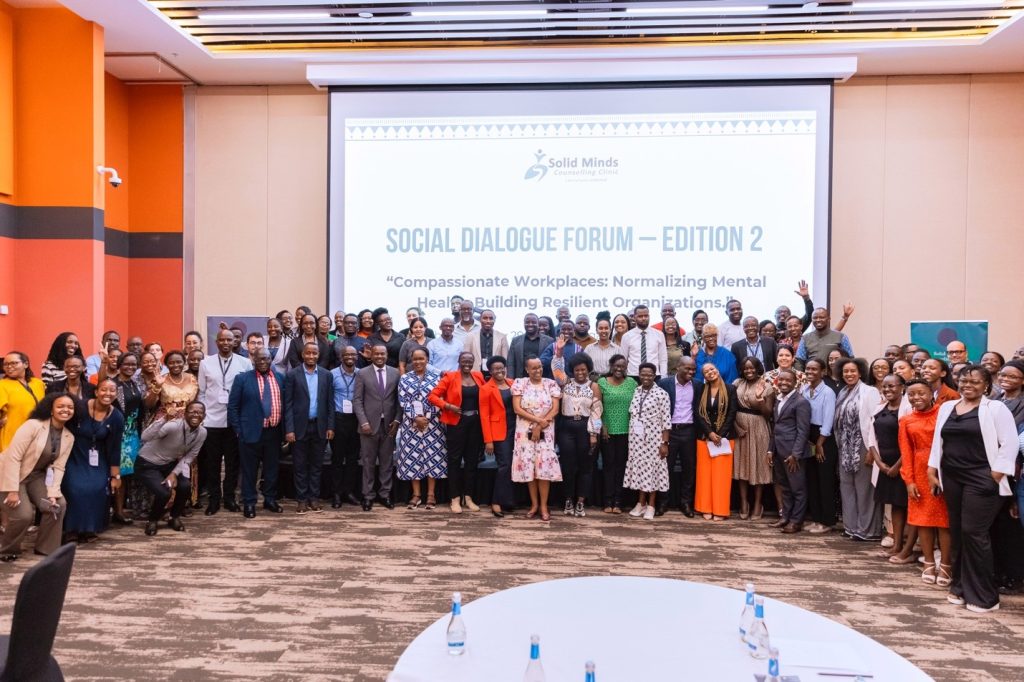Opening remarks at the second edition of the Social Dialogue Forum under the theme: “Compassionate Workplaces: Normalizing Mental Health, Building Resilient Organizations.”

Good morning, distinguished guests, colleagues, and dear friends,
It truly means a lot to see all of you here this morning to participate in discussions around Compassionate Workplaces: Normalizing Mental Health, Building Resilient Organizations.
Twenty years ago, I found myself in a workplace that was emotionally challenging. I worked with genocide survivors and was expected to be strong. I smiled when we were expected to, delivered results, On the surface, everything looked fine. But underneath that surface There was exhaustion going home to cry, and not sleeping at all. I remember waking up some mornings feeling completely broken but still showing up, because that’s what I thought strength looked like. Like many of us raised in cultures that celebrate resilience and silence, I believed that vulnerability was weakness. That pain should be left at home never brought to work.
But here’s the truth I learned the hard way: I didn’t leave my pain at the door. I carried it to the office and in my field work. Things reached a breaking point when I faced a personal mental health crisis. I was emotionally drained, physically unwell, and most painfully ashamed that I couldn’t simply “push through.” I knew then that something had to change.
It wasn’t only the the people we were supporting who were suffering. We the workers were burning out too. We were surrounded by trauma but had nowhere to process it. We gave compassion to others, but had no system that gave compassion back to us.
That realization changed everything for me when I started seeing counsellors..
Then my wife and I started dreaming of a different kind of space a space where mental health wasn’t a hidden conversation, but the foundation of how we live and work. A space where healing was for everyone not just for those visibly in crisis. That dream became Solid Minds.
Today, we are proud of what we are doing together with all my colleagues past and present. Because the truth is, resilient organizations are not built on systems or outputs. They are built on people. People who are human. People who have limits. People who are carrying grief, or caring for a sick child or spouse, or struggling with burnout. And these people thrive when they feel seen, supported, and safe.
- At King Faisal Hospital, a recent study indicated that over 50% of staff experienced burnout, with even higher rates among doctors and nurses in intensive care and emergency departments.
- In Kenya, a recent survey revealed that over 35% of employees have taken unreported leave due to stress, anxiety, or burnout; often labeled simply as “sick days” to avoid stigma.
- And in Uganda, only 6% of employers offer any structured mental health support to their staff despite rising rates of depression among young professionals and frontline workers.
A compassionate workplace is not about being soft. It’s about being strong enough to face the truth of what people carry. It’s about being bold enough to say: Mental health is health.
We talk often about performance, innovation, and scale. But what if I told you the most radical thing your organization could invest in is… kindness?
Kindness in leadership. In policies. In how we respond to failure or fatigue. In how we make room for rest and recoverynot just more output.
This is the cultural shift we’re here to talk about today: From pretending and coping, to caring and thriving.
At Solid Minds, we’ve walked this journey with organizations who chose to lead with compassion. I’ve witnessed boardrooms become spaces of openness. I’ve seen managers check in not just on project status but on emotional well-being. I’ve seen entire teams change when just one leaderdared to say: “I’m not okay and that’s okay.”
And you know what?
The outcome isn’t just better mental health. It’s stronger teams. More trust. Better collaboration and More sustainable success.
So today, I want to leave you with a few questions. Not as a challenge, but as an invitation:
- What kind of culture are you building?
- Is your team safe to be human at work or just expected to perform?
The organizations that will truly thrive in the future are the ones brave enough to care today.
Thank you for being here. Thank you for being willing to lead from the heart.
